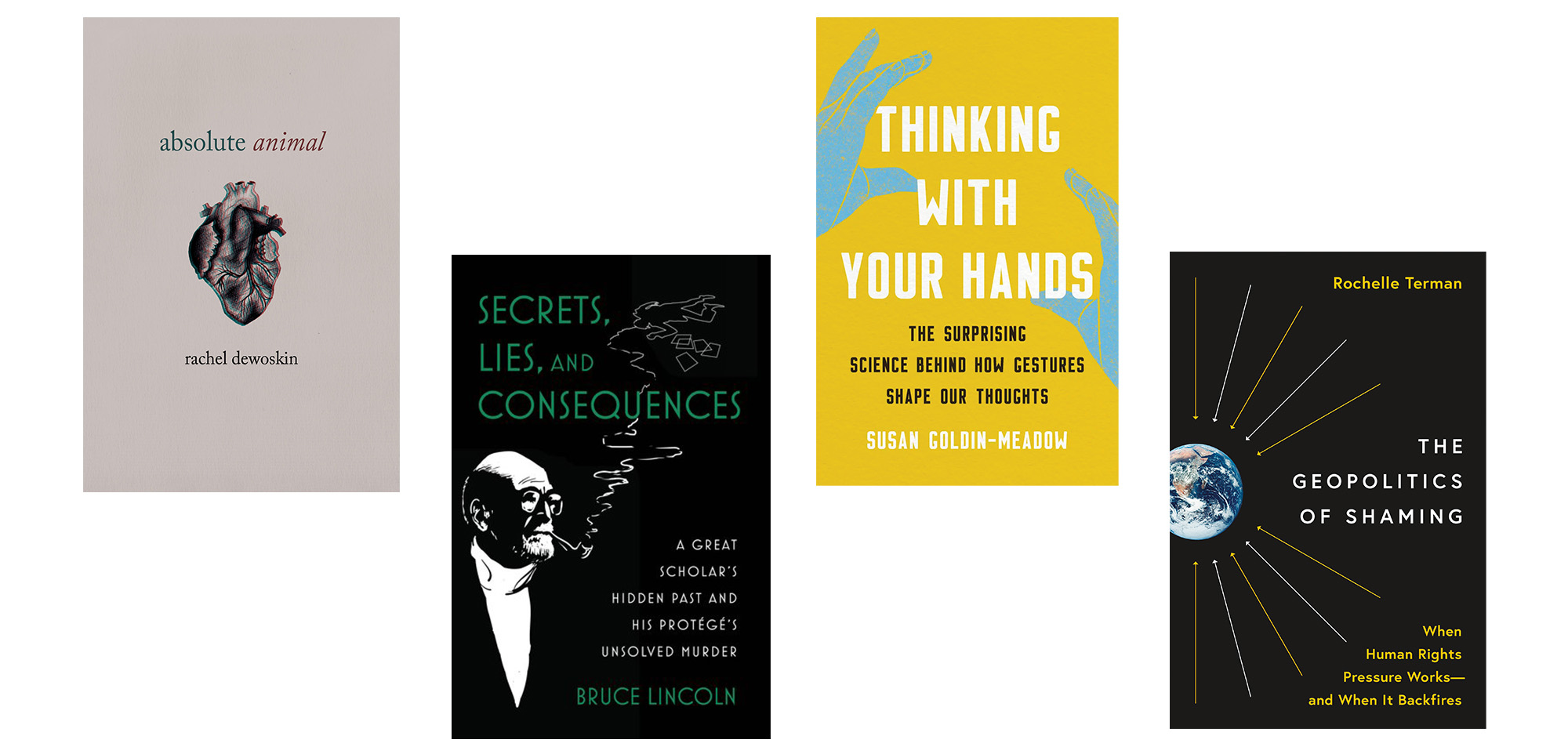
A selection of recent books by UChicago faculty members.
Absolute Animal
By Rachel DeWoskin, Associate Professor of Practice in the Arts
Vladimir Nabokov once wrote that “a writer should have the precision of a poet and the imagination of a scientist.” In this new collection of 41 poems, Rachel DeWoskin uses formal poetic techniques to explore the boundaries and connections between human and animal behavior. Sonnets about heart surgery and meditations on loss accompany studies of romance among voles and reflections on climate change. Incorporating translations of poems dating as far back as the Tang dynasty, the author also stages encounters across time, place, and language. DeWoskin immerses the reader in the disorder and uncertainty of being a human today, as well as in that which enriches our experiences.
Secrets, Lies, and Consequences: A Great Scholar’s Hidden Past and His Protégé’s Unsolved Murder
By Bruce Lincoln, AM’73, PhD’76, Caroline E. Haskell Distinguished Service Professor Emeritus of the History of Religions in the Divinity School
In early 1991, Ioan Culianu, associate professor of the history of religions in the Divinity School, began to receive threatening messages. Soon after, he was shot and killed in a Swift Hall bathroom. It was presumed that Culianu, who had emigrated from Romania in the late 1980s, was targeted by the Romanian secret police for articles he published after the fall of Nicolae Ceaușescu, but the case was never solved. Before his death, Culianu gave some papers to a colleague for safekeeping. Bruce Lincoln inherited these papers, which turned out to be Culianu’s English translations of articles written in the 1930s by his mentor Mircea Eliade, a fellow UChicago Divinity School professor and Romanian expatriate; in some, Eliade wrote in support of Romania’s fascist, deeply anti-Semitic Iron Guard. Quoting from his own translations of these writings, Lincoln explores what they can tell us about Eliade’s past, the relationship between Eliade and Culianu, and the circumstances surrounding Culianu’s murder.
Thinking with Your Hands: The Surprising Science Behind How Gestures Shape Our Thoughts
By Susan Goldin-Meadow, Beardsley Ruml Distinguished Service Professor in the Departments of Psychology and Comparative Human Development
It’s often assumed that language has a privileged connection to thought, but Susan Goldin-Meadow argues that gesture has much to teach us about how we think. Through gesture, we convey thoughts we don’t know how to—or don’t want to—express through language, and even thoughts we are unaware of thinking. Someone who says men and women are equally good leaders, but then gestures at eye level when discussing the leadership abilities of men and below eye level when discussing women, may reveal a bias toward male leaders. Children may indicate they’re on the brink of understanding a new concept by showing the correct solution to a problem through gesture, even while saying an incorrect answer. Drawing on decades of her own research and that of students in her lab, Goldin-Meadow shows how gesture can be an important tool for parenting, education, and health care. “What if,” the author asks via a chapter’s title, “gesture were considered as important as language?”
The Geopolitics of Shaming: When Human Rights Pressure Works—and When It Backfires
By Rochelle Terman, AB’08, Assistant Professor in the Department of Political Science
Though a framework has emerged for defining and monitoring human rights, there is no centralized body that protects these rights globally. A common enforcement method is pressure through shaming by other countries. Despite numerous quantitative studies and specific cases that show the success of such pressure, it sometimes backfires. Drawing on large-scale data, case studies, and original surveys, Rochelle Terman argues that enforcement of human rights norms is political. She emphasizes the role that existing geopolitical relationships play in a nation’s decision to get involved in human rights enforcement and in the success or failure of shaming. While adversaries may be quick to condemn violations, they may provoke resistance from the offending country, ultimately worsening human rights practices. Shame from allies is more effective, but those parties may be less willing to impose sanctions. Taking seriously how human rights enforcement is politicized, Terman contends, is necessary to ensure its success.
